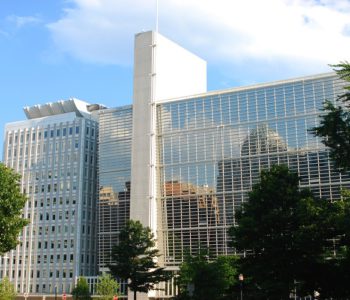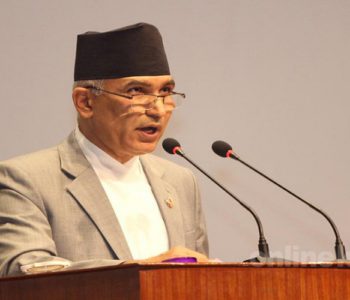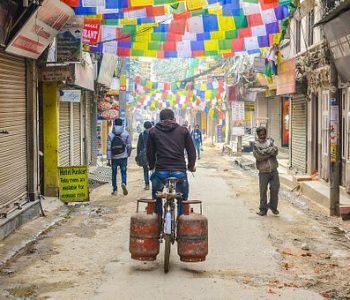‘Indicators do not speak on behalf of Finance Minister Khatiwada’

Shattered and triggered by the COVID-19 pandemic, Nepal’s economy is struggling to sustain and bounce back. While the transmission of the pandemic has reached the community level in the country, businesses and economic activities have been completely shut since months. As recent indicators paint a bleak picture of the country’s economy in the future, the government’s response in fighting the economic shocks caused by the COVID-19 has been criticized and questioned from different quarters. Against this backdrop, Biswo Poudel, a senior economist, shares his views with Sujan Dhungana of fiscalnepal.com on various issues related to the economy.
As an economist how do you assess the current situation of the country’s economy?
The COVID-19 pandemic is a major shock to economies across the world including Nepal. A majority of industries remained shut temporarily throughout the lockdown and some of them failed to retain employees. Meanwhile, some industries were paying merely 12.5 percent of the total salary to retained staffs.
While a few sectors were hit significantly due to the pandemic, those sectors that could counter balance the crisis have not been able to perform well due to lack of effective regulatory support from the government. For instance, home delivery service providers could create new jobs for thousands of people at this time which would provide relief to those who have lost their jobs.
However, the government could not promote such services effectively. Similarly, this is a time when creative businesses and start-ups could flourish and give momentum to the economy despite the lockdown. However, the government has failed to act smartly and use this crisis as an opportunity. The other dynamic is that the government seems quite satisfied as remittance inflows were not down significantly.
Similarly, money in the banking system remains frozen as there is no demand for loans and interest rate has come down. The current situation is completely against investment and is similar to the situation during the decade-long Maoist insurgency. If you see, loan demand after the earthquake in 2015 surged gradually and interest rate also appreciated.
People will plan new businesses and investment only when the end of the crisis is within sight. Economic activities are down and businesses are in no mood to further invest despite the fact that huge sums of money lie idle in banks.
The private sector was a bit encouraged with a few measures adopted by the government in addressing their plight along with easing the months-long lockdown. However, the government has once again imposed second phase of lockdown bringing all economic activities to a standstill. How do you feel will the economy move ahead in coming days?
It is now almost clear that the situation will not be normal unless a vaccine for the virus is developed. Thus, we don’t know when things will get normal. At such times, businesses and economy have no option other than to focus solely on survival. The major thing is how this crisis affects the balance in the economy.
For instance, if businesses only focus on survival and there is no demand for loans from banks, then banks are not going to remain silent just holding the public’s money and paying them interest. In a worst-case scenario, banks will either not accept deposits or interest rates will come down and at one point it might be negative.
In such a situation, there will be limited tradable things like shares and land. Right now, the government should have promoted investment in creative businesses. However, the problem with the government, especially among those in leadership positions, is that they are not serious about promoting opportunities during the crisis. The government should have facilitated IT services and home delivery services, among other creative businesses.
If required, the government should also provide some subsidy to such businesses so that they can boom and ensure momentum in the economy. Also, the government should work on areas like road maintenance and development work and prepare unique identification numbers of houses too. Unless we develop identification numbers of houses, e-commerce businesses will not flourish.
You mentioned earlier that the time today is for survival, be it businesses or the economy at large. How satisfied are you with the efforts made by the government for the survival of businesses and the economy?
I do not think that the government has put in enough effort for the survival of business and the economy during this pandemic. In fact, the government is totally clueless. The private sector welcomed a few regulations brought by the government initially to address their concerns. Though the government tried facilitating businesses and the economy through immediate relief measures for the initial three months, it failed to analyze the long-term impact of the pandemic and introduce necessary recovery plans.
For instance, cement factories were operating below capacity before the pandemic. What they want from the government is for good roads to be developed and projects to be implemented so that the consumption of cement rises. Instead of bringing in farsighted policies and fostering investment and business growth, some government policies instead are detrimental to investment and businesses. In the name of regulating businesses that are growing, a few government policies are unnecessarily pressurizing businesses and discouraging investment.
One measure that the government should adopt is to redefine its relationship with banks and develop experts in the sector. For example, banks today invest billions of rupees in hydropower while few banks have good experts who understand the nitty-gritty of the sector. Banks therefore cannot properly evaluate funds going to the sector and the risks involved.
What should be the government’s approach at present in responding to the COVID-19?
The government should work on both short-term and long-term recovery measures to address COVID-19 and its impact. On the long-term front; it is high time for the government to inject investment in infrastructure. Prime Minister KP Sharma Oli wasted the initial years of his tenure talking about infeasible railways and waterways. What we need today is expansion of road networks and widening of existing roads. Expansion of roads and other infrastructure will connect markets, boost economic activities and ensure growth of the economy. But the government does not have any such long-term vision and master plan.
Similarly, the government should also work on short-term measures equally. In fact, short-term visions are the base for long-term visions and they are required to enable long-term plans. Immediate relief and sustainable package to various sectors and the public affected by the crisis, road maintenance works, city beautification plans and other works to improve day-to-day businesses, among others should be incorporated under short-term plans. The government should move forward integrating both short-term and long-term plans. However, the present government has been a massive failure on this front.
The country’s economy is continuously facing hassles and is failing to cope with the current crisis despite having an economy-friendly finance minister, who is also an economist. Why is it so?
It is true that the pace of the economy was not as good as expected in the first three years of the current government but the finance minister is in denial. The current finance minister is an expert in terms of economy/economist. But even good economists do not know everything about the economy and are generally not good managers. We assume that a minister with long political history is a good manager too. I think the finance minister could not properly define the government’s relationship with the private sector initially. I believe that intimacy within party members/leaders of the current finance minister was also not good.
All these factors might have contributed to adverse impact his role as a finance minister. One can be a good economist, but managing the Finance Ministry and other political things is a totally different ballgame and requires management qualities. Economic indicators including investment, employment generation and performance of share market, among others, do not speak on behalf of the finance minister.
His initial reading of the country’s economy was also wrong. He tried to develop the narrative that he inherited a bankrupt country, which was wrong. Although he later also seems to have tried to bring the economy on track but the results are yet to be seen. If he has done well to bring in foreign investment, it might take a few years before we can see tangible results of his efforts.
The finance minister has been claiming that a majority of indicators are positive despite COVID-19. What is your take on this?
Despite his claim, indicators do not speak on behalf of Khatiwada. The economy he inherited was the economy that was already witnessing six percent growth. However, multilateral agencies like World Bank and others had faith on Khatiwada which is good for the country. It is always good for the country to have good relationship with donor agencies as agencies like the World Bank and Asian Development Bank usually provide us loans at better terms than several bilateral agencies.
But I don’t blame Khatiwada for exuding confidence. It is a standard line of finance ministers to talk positive about the economy in front of the public or other partners.











Facebook Comment